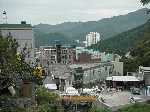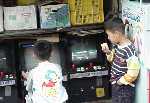Note : This commentary was
also published in
The Asia Times on
October 12, 2006
For related articles
see :
North
Korea - The Japanese Card (2003)
North Korea - The Smell of Rat (2002)
Who Wants a Reunified Korea? -- some
reflections on war, peace and the armaments business (2001)
Korea,
North & South:
The Geopolitics of Unification (2001)
My friendly neighbourhood supermarket checkout girl greeted me with a joke about emigrating to Australia. Geopolitics is not the currency of daily conversation in this small, sleepy city in central South Korea, so clearly something was up. For a crowded population living in a tiny state on top of 20 nuclear power reactors (more on the way), and under permanent threat of annihilation from artillery, missiles and biochemical warfare from their near neighbour, South Koreans are remarkably phlegmatic about hypothetical threats. The elders have blocked them out of consciousness, and for the young, raised like battery chickens in concrete block apartment towers, ignorance is bliss. Computer game battles are far more real. Suicidal drivers aside, this is one of the safer parts of the world to live in, day on day. It is rare to feel personal physical menace. Yet somehow, Kim Jong Il's atom bomb has penetrated the blood-brain barrier, torn the delicate psychological veil behind which ordinary apolitical South Koreans preserve a sense of normalcy, (even the sale of condoms skyrocketed as folk contemplated doom). At the very least, that signals a sea change in South Korean populist politics.
Political power the world over is a depraved business, mostly in the hands of rather depraved people. Power, quite simply, is a narcotic for humans, and for the addict there is no greater priority than guaranteeing the supply. Deception, fraud, murder and mayhem are small change in the pursuit of power. This is hardly news. A large part of the world's literature deals with the subject exactly. News happens when there is competition amongst the mafia gangs of politics over territory. If they are fighting over shakedown money in some unlucky city, that's stuff for the tabloids. If they are fighting over countries, it is called history.
North Korea is a mafia state par excellence. For two generations now a whole nation has been held hostage to depredations of a ruthless power clique. How have they gotten away with it? Internally, their tools have been propaganda, brainwashing, isolation, terror and starvation. Externally, the story is complicated. The Korean War (1950-53) killed several million Koreans in fratricidal conflict and traumatized the whole population. They weren't the only losers. China lost over a million young men for no gain whatsoever, and geopolitically by sacrificing any possibility at the time of reconciliation with the United States, it effectively lost Taiwan. The Soviet Union thought it had gained a client state in North Korea, yet the historical record shows costs but no profit for the Soviets out of that relationship. When the USSR dissolved, any remnant illusions about influence on the Korean peninsula went with it. The United States acquired an excuse, if it wanted one, for maintaining a presence on the Korean peninsula, but with the passing of time was seen by a large proportion of the South Korean population less as a saviour than an occupier. The Japanese, who in spite of lingering animosity have been able to finesse their relationship with South Korea on many levels and profit handsomely, gained a dour and implacable enemy in North Korea. The South Koreans themselves have lived with the knowledge of permanent insecurity and castrated statehood. They swing between desperate energy to survive and psychological denial helped along by a passion for alcoholic oblivion.
The North Korean mafia thus established their turf and were able to maintain an uneasy stability with the wider world at their margins. There were provocations and skirmishes, but they have survived for sixty years. The reasons for this warped success have been pretty elemental. They have not been a serious threat to anyone, except perhaps the South Koreans. Recent memories of the bloody Korean War have been a real discouragement to letting the dogs of war loose again. Nobody relishes that prospect, and there isn't even the temptation of booty. North Korea isn't floating on oil. It can't even feed itself. In Pentagon-speak, there is hardly a worthwhile list of assets to bomb back to the stone age, and (unlike in China) there's no restive North Korean middle class to put pressure on the Party.
The North Koreans have always held just one major ace : it is a city called Seoul, and it is within direct range of massive North Korean artillery. The greater Seoul metropolitan area contains about 22 million people. The Pyongyang command cabal has demonstrated repeatedly and deliberately that it has no compassion for its compatriots in the north, let alone the south. Any attack on their lair could therefore easily involve millions of deaths in Seoul. Such a sacrifice is of course unconscionable to South Koreans, but even the nabobs in Washington, Tokyo and Beijing, who aren't bleeding heart types, won't play that card without serious provocation.
The small North Korean underground test on October 9, 2006 may provide real provocation for external action against the North Korean regime, if it was actually nuclear. That regime is no longer simply a threat to Seoul. It is now posing as a significant and growing threat to Japan, and possibly even to Beijing. They will be looking for any opportunity to do something about it. The loudest noises are likely to come from Japan whose conservatives have the perfect excuse to jettison the armament restrictions of the Japanese constitution. The ultimate effective sanctions however will emanate from China once China's balance of geopolitical interests tilt against maintaining the status quo in North Korea.
On paper, North Korea is China's ally and a buffer state against the unwelcome presence of American military and economic power on the Korean peninsula. It has also looked like a handy lever against Japanese pressure. The reality of the relationship has been less wholesome than that for Beijing. Like the Soviets before them, they have found the North Koreans eager to grasp goodies, but reluctant to reciprocate. Worse, the decrepit public fundamentalism and private gangster mentality of the North Korean elite has been an insuperable barrier to real economic development. This in turn has much hampered the economic potential of China's industrial north-east provinces. An economic power house like South Korea adjacent to these Chinese provinces would create great synergy and mitigate the simmering political revolt which now characterizes this rust belt.
North Korea's defensive and attack postures are concentrated in the South. A Chinese invasion from the north would be extremely hard for them to deflect. Retaliating against Seoul for Chinese actions from the north would make little strategic sense, especially since the South Koreans, looking aghast at this situation would be unlikely to coordinate with the Chinese military in such a conquest. Further, Kim Jong Il and company surely realize that the hard men in Beijing would scarcely be open to blackmail on behalf of Seoul's wretched citizens...
Well, this is all kite flying. It is very, very difficult to guess the internal machinations which would lead the Chinese leadership to such a definitive commitment. China itself is a vast, roiling polity, virtually ungovernable without a cloaked threat of blood and iron (as Bismarck would have said). However, it's own military is much less than a well-oiled machine ready to jump to the master's bidding. Perhaps more in line with the thinking of those gents in Zhong-Nan-Hai nowadays would be a distaste for machine gun diplomacy, but a heavy investment in extortion, subversion, economic blackmail, and at the final extreme, things which go bump in the night. All up, Kim Jong Il's might need more than an armour plated railway carriage and a taster for poisoned food if he wants to stave off a sticky end.
copyrighted © Thorold (Thor) May 2006
all rights reserved, http://.thormay.net
thormay AT yahoo.com
|
|
Doubt well, do what you can, then let it be. Presidents, priests, wage slaves, hustlers, men and women, kids, we all live by the grace of those we love to despise... |
|
|
|
 |
|
Bansong nestles in steep valleys |
|
 |
|
tiny-tot video games |
|
 |
|
a blizzard of seagulls |
|
 |
|
|
food comes with many side dishes |
|
|
. |